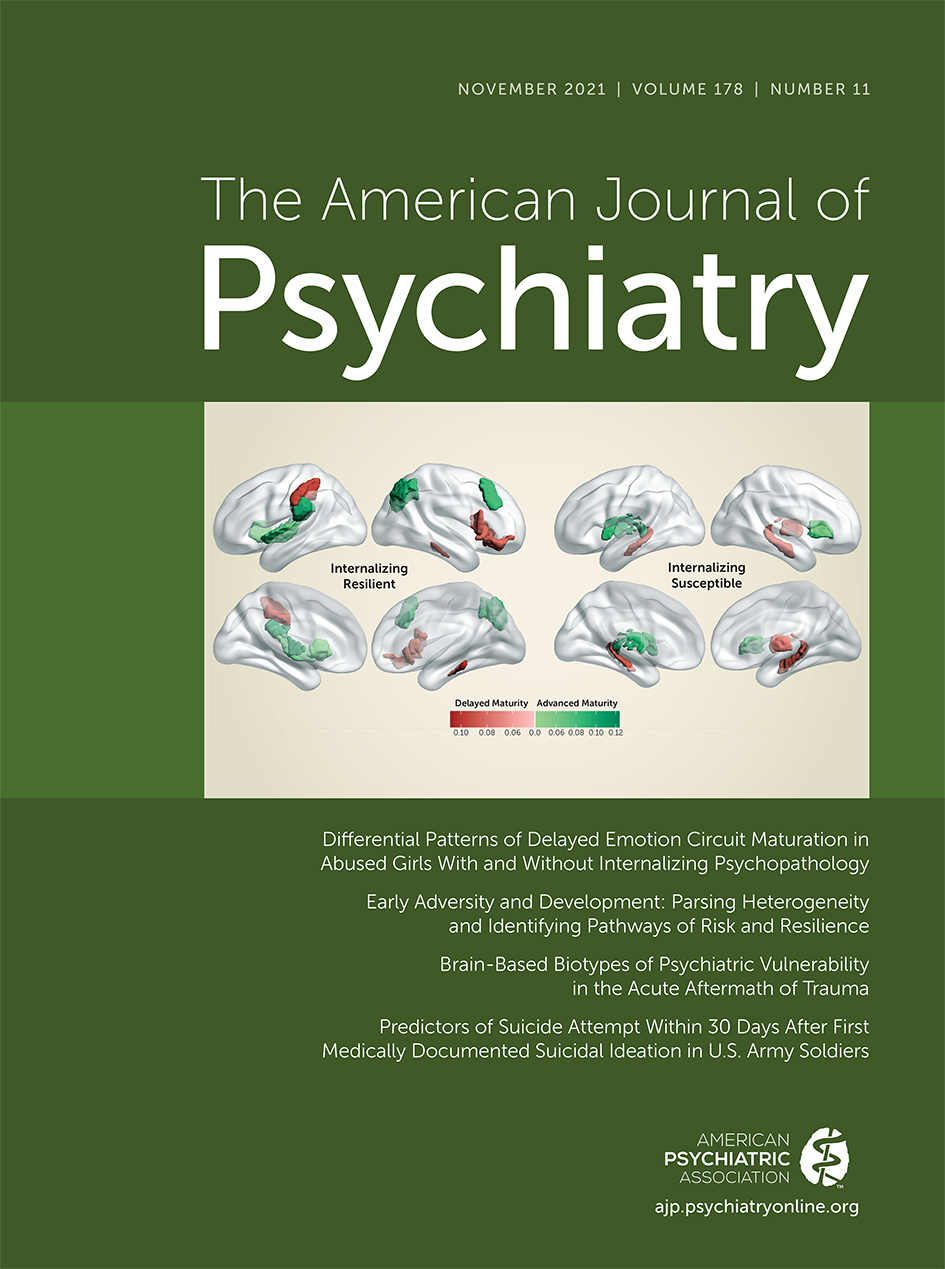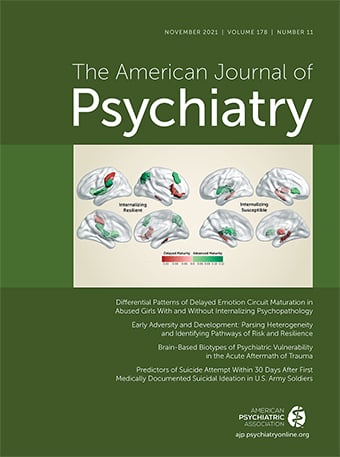Brain-Based Biotypes of Psychiatric Vulnerability in the Acute Aftermath of Trauma
Abstract
Objective:
Methods:
Results:
Conclusions:
METHODS
Participants
| Cohort | ||||||
|---|---|---|---|---|---|---|
| Discovery (N=69) | Replication (N=77) | Group Comparison | ||||
| Characteristic | N | % | N | % | χ 2 | p |
| Site | 1.81 | 0.61 | ||||
| 1 | 5 | 7.2 | 2 | 2.6 | ||
| 2 | 28 | 40.7 | 32 | 41.6 | ||
| 3 | 19 | 27.5 | 24 | 31.2 | ||
| 4 | 17 | 24.6 | 19 | 24.7 | ||
| Female | 51 | 73.9 | 48 | 62.3 | 2.23 | 0.14 |
| Race/ethnicity | 6.62 | 0.09 | ||||
| Hispanic/Latino | 11 | 15.9 | 12 | 15.6 | ||
| White | 20 | 29.0 | 34 | 44.2 | ||
| Black/African American | 37 | 53.6 | 27 | 35.1 | ||
| Asian, Hawaiian, American Indian, or other | 1 | 1.4 | 4 | 5.2 | ||
| Education | 20.02 | 0.05 | ||||
| Less than high school | 3 | 4.3 | 3 | 3.9 | ||
| High school diploma/GED | 26 | 37.7 | 16 | 20.8 | ||
| Some college/associate’s degree | 29 | 42.0 | 29 | 37.6 | ||
| Bachelor’s degree | 8 | 11.6 | 19 | 24.7 | ||
| Master’s degree | 3 | 4.3 | 8 | 10.4 | ||
| Doctorate | 0 | 0.0 | 2 | 2.6 | ||
| Employment status | 2.15 | 0.71 | ||||
| Employed | 48 | 69.6 | 48 | 62.3 | ||
| Retired | 1 | 1.4 | 3 | 3.9 | ||
| Homemaker | 1 | 1.4 | 1 | 1.3 | ||
| Student | 2 | 2.9 | 4 | 5.2 | ||
| Unemployed, disabled, or other | 9 | 13.0 | 14 | 18.2 | ||
| Data missing | 8 | 11.6 | 7 | 9.1 | ||
| Yearly family income | 4.49 | 0.48 | ||||
| <$19,000 | 17 | 24.6 | 17 | 22.1 | ||
| $19,001–$35,000 | 18 | 26.1 | 19 | 24.7 | ||
| $35,001–$50,000 | 10 | 14.5 | 13 | 16.9 | ||
| $50,001–$75,000 | 4 | 5.8 | 9 | 11.7 | ||
| $75,001–$100,000 | 3 | 4.3 | 7 | 9.1 | ||
| >$100,000 | 9 | 13.0 | 5 | 6.5 | ||
| Data missing | 8 | 11.6 | 7 | 9.1 | ||
| Trauma type | 42.82 | 9.51 × 10 –7 | ||||
| Motor vehicle collision | 69 | 100.0 | 41 | 53.2 | ||
| Physical assault | 0 | 0.0 | 15 | 19.5 | ||
| Sexual assault | 0 | 0.0 | 2 | 2.6 | ||
| Incident causing traumatic stress exposure to many people | 0 | 0.0 | 1 | 1.3 | ||
| Nonmotorized collision (e.g., bicycle, skateboard) | 0 | 0.0 | 6 | 7.8 | ||
| Fall <10 feet | 0 | 0.0 | 4 | 5.2 | ||
| Burn | 0 | 0.0 | 1 | 1.3 | ||
| Animal-related | 0 | 0.0 | 3 | 3.9 | ||
| Other | 0 | 0.0 | 4 | 5.2 | ||
| Mean | SD | Mean | SD | t | p | |
| Age (years) | 33.6 | 12.1 | 35.3 | 13.7 | –0.80 | 0.42 |
| Injury severity scale | 2.5 | 2.4 | 2.3 | 1.8 | 0.80 | 0.42 |
| Patient-rated chance of dying | 5.6 | 3.6 | 4.8 | 3.3 | 1.48 | 0.14 |
Demographic Variables and Psychiatric Assessment
MRI
Acquisition.
fMRI tasks.
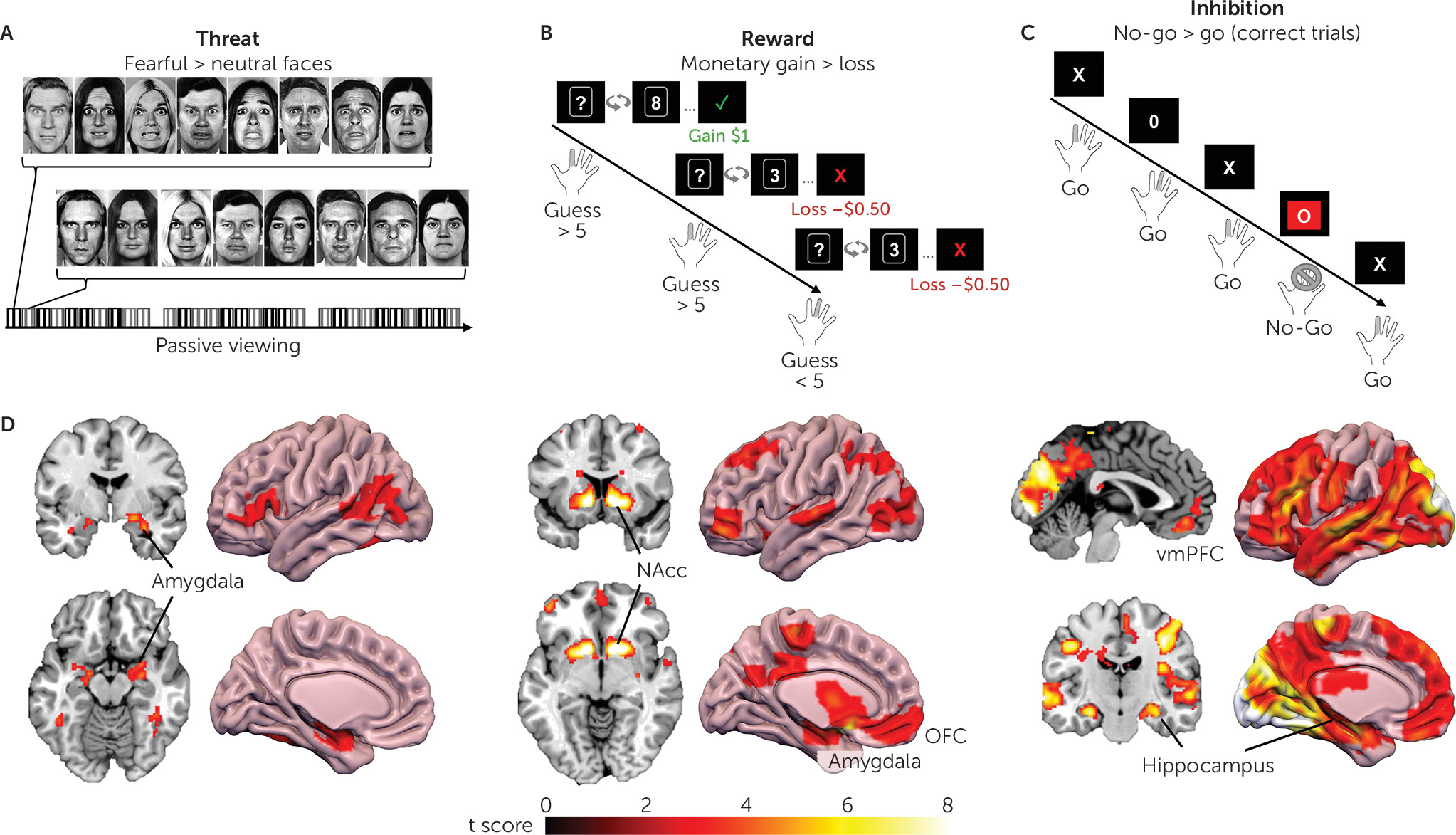
Preprocessing and analysis.
Fear-potentiated startle.
Clustering Analysis
Analysis of Posttrauma Outcomes by Cluster
RESULTS
Covariance Among the fMRI Tasks and Regions of Interest
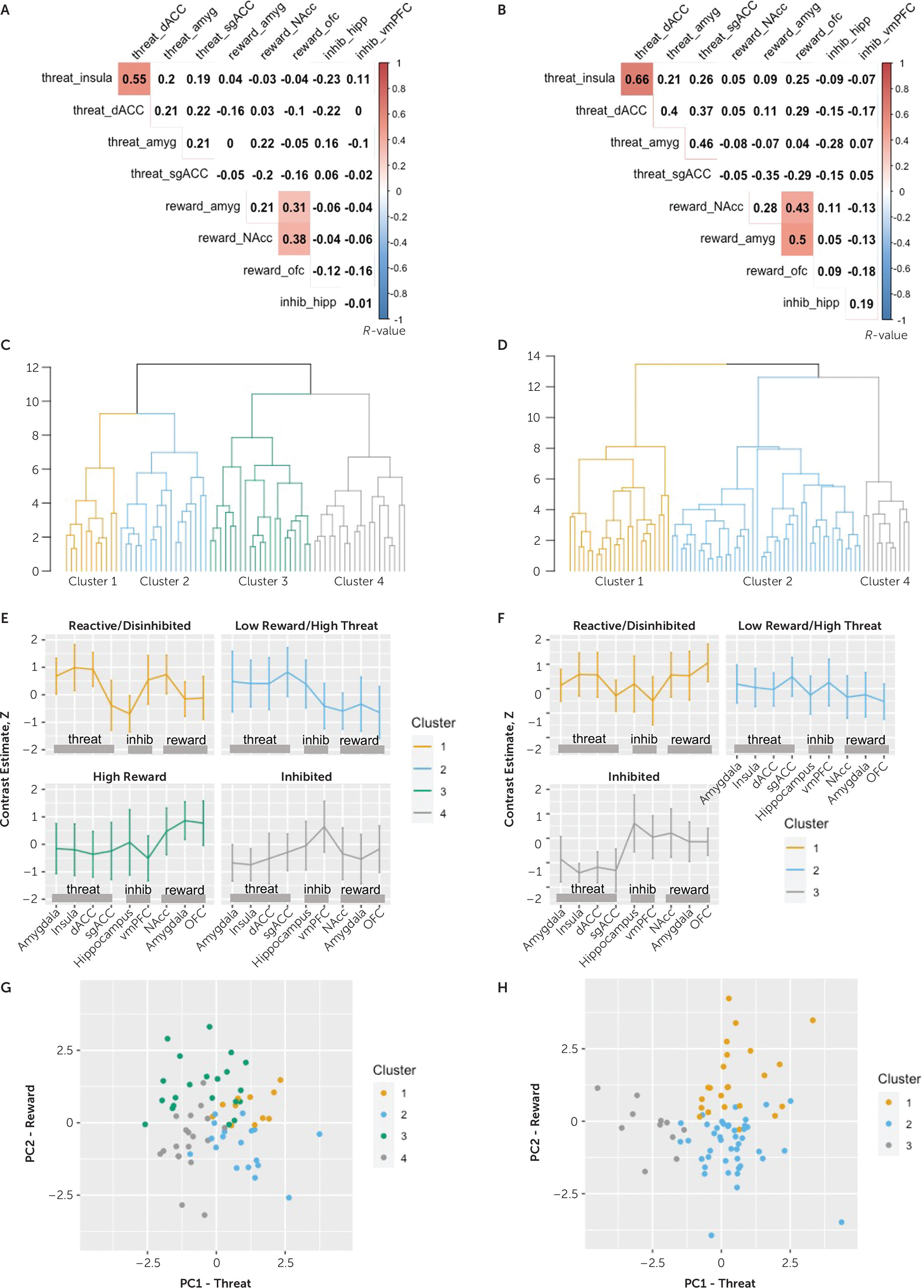
Clustering of Individuals Using Task-Based fMRI 2 Weeks Posttrauma
Prospective Trajectories of Mental Health Among the Four Clusters
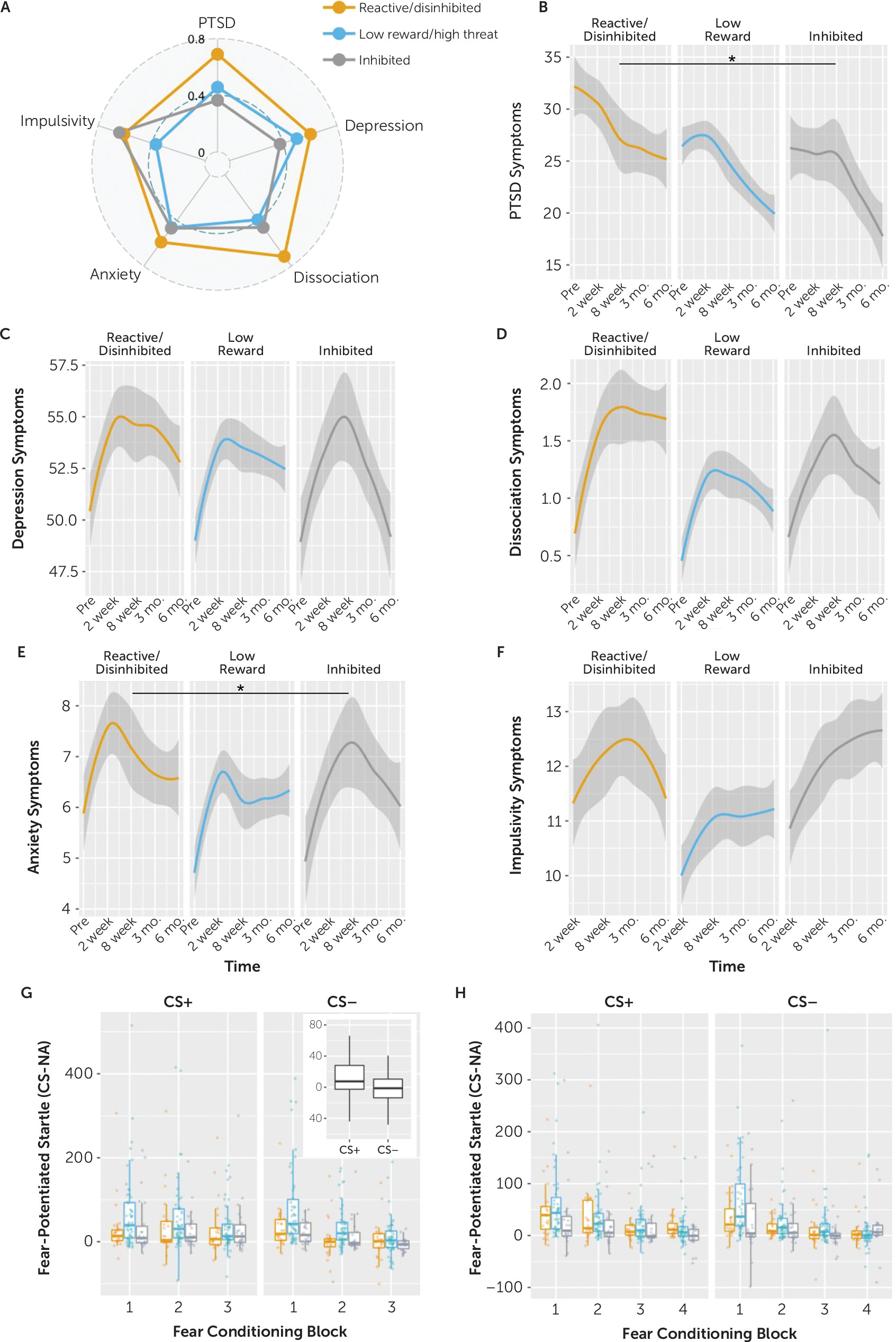
Cluster-Based Compared With Dimensional Models for Predicting Longitudinal Posttrauma Outcomes
Convergent Validity With Fear-Learning Phenotypes
Voxel-Wise Whole-Brain Comparison of Cluster Groups
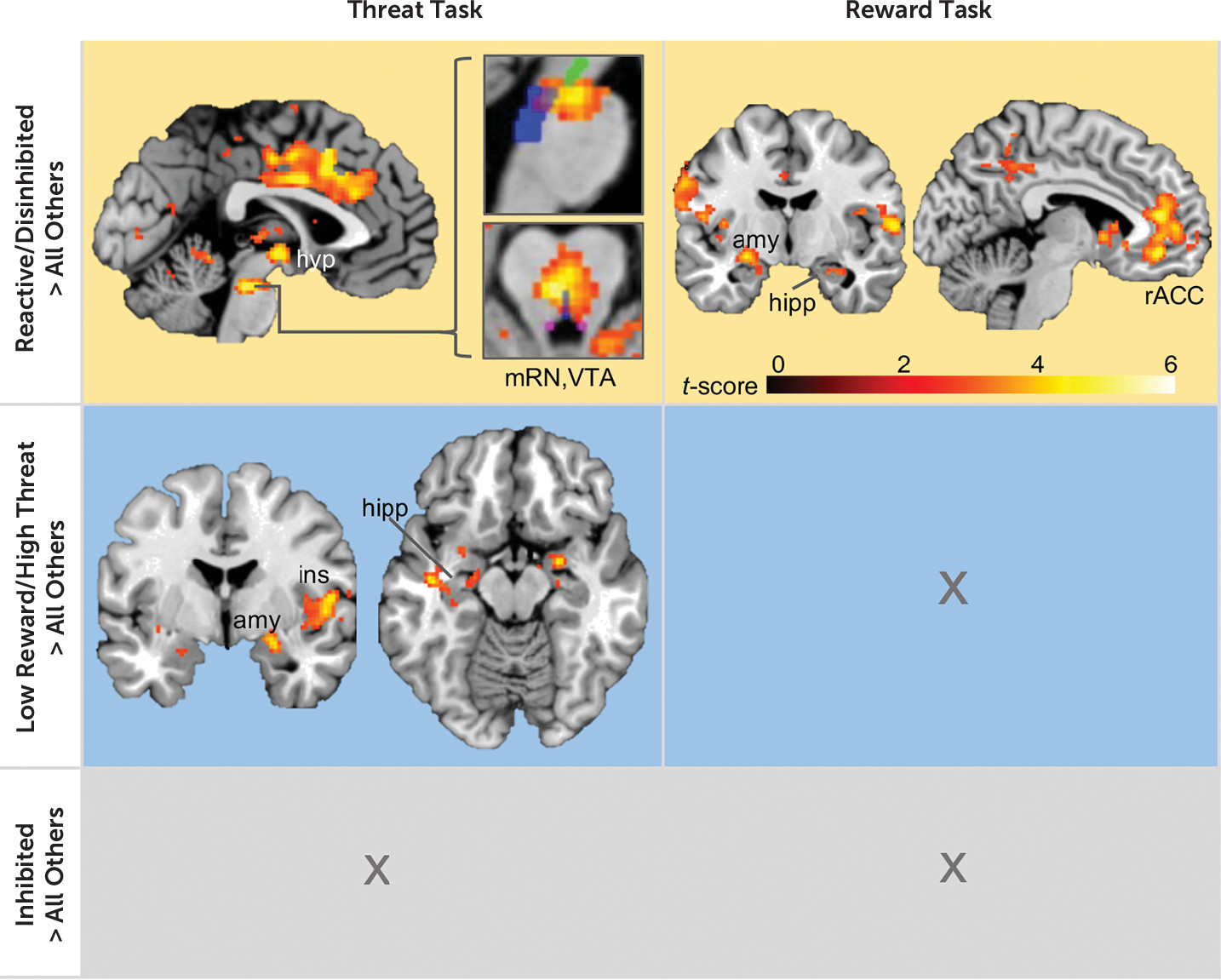
DISCUSSION
Interpretation of the Biotypes
Limitations
CONCLUSIONS
Footnotes
Supplementary Material
- View/Download
- 624.08 KB
References
Information & Authors
Information
Published In
History
Keywords
Authors
Competing Interests
Funding Information
Metrics & Citations
Metrics
Citations
Export Citations
If you have the appropriate software installed, you can download article citation data to the citation manager of your choice. Simply select your manager software from the list below and click Download.
For more information or tips please see 'Downloading to a citation manager' in the Help menu.
View Options
View options
PDF/EPUB
View PDF/EPUBLogin options
Already a subscriber? Access your subscription through your login credentials or your institution for full access to this article.
Personal login Institutional Login Open Athens loginNot a subscriber?
PsychiatryOnline subscription options offer access to the DSM-5-TR® library, books, journals, CME, and patient resources. This all-in-one virtual library provides psychiatrists and mental health professionals with key resources for diagnosis, treatment, research, and professional development.
Need more help? PsychiatryOnline Customer Service may be reached by emailing [email protected] or by calling 800-368-5777 (in the U.S.) or 703-907-7322 (outside the U.S.).
